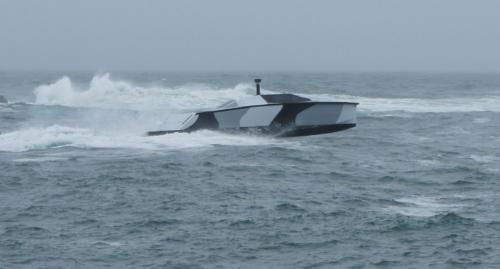
Piranha is an unmanned surface vessel (USV) designed to offer extended range and payload. It can enable a broad range of operations at sea – including surveillance, anti-piracy and surface warfare – reducing operational costs and risks to sailors.
Built using Zyvex Technologies' Arovex™ carbon nanotube (CNT) reinforced carbon fibre prepreg the Piranha weighs 8400 lbs; boats of similar size typically weigh 40 000 lbs. The 75% lighter Pirahna is therfore easier to transport and more cost-effective to operate.
Fuel efficiency
After 6 months of extensive testing, the Piranha has completed its final sea trial – an approximate 600 nautical mile (nm) rough-weather sea test off the shores of Washington and Oregon, USA.
According to Zyvex, a conventional aluminium or glass fibre reinforced plastic boat would have consumed 50 gallons or more per hour at cruise speed, but test results show that Piranha consumed only 12 gallons of fuel per hour while cruising at 25 knots.
"Metal boats have come a long way over the past 150 years, but it's only possible to reach new standards of performance using next-generation advanced composite materials," claims Lance Criscuolo, president of Zyvex Technologies.
Piranha can travel 2800 nm without refueling and has operated in open ocean conditions with waves exceeding 12 ft. Russell Belden, vice president of Zyvex Technologies, notes that other similar sized vessels built from heavier materials can only travel 450 nm without refueling and have limited rough weather performance.
"The lightweight Piranha delivers significantly better fuel efficiency and capability than any vessel this size," he reports. "The most expensive part of operating a boat can be the fuel costs. Since the Piranha gets 2.5 miles per gallon going 25 knots, its operators would only spend one fourth as much on operating costs."
Defence and civilian applications
Piranha finished the sea tests in time to travel for its debut at the Sea Air Space show near Washington, DC, on 11-13 April.
Columbus, Ohio-based Zyvex says defence contractors are evaluating the Piranha for use as an unmanned platform with a variety of mission applications, including anti-piracy, harbour patrol, and oceanographic surveying.
"Zyvex Technologies is redefining standards for building and designing stronger and lighter products for civilian and defence uses," says Zyvex's Criscuolo. "Our technology, demonstrated by the Piranha, is a great option for better maritime vessels, manned and unmanned."
"There's nothing else on the water that has this combination of speed, efficiency, payload, and range. More and more structures will be built with our nano-enhanced advanced composites, taking industries such as marine, defence, and infrastructure to entirely new levels."






